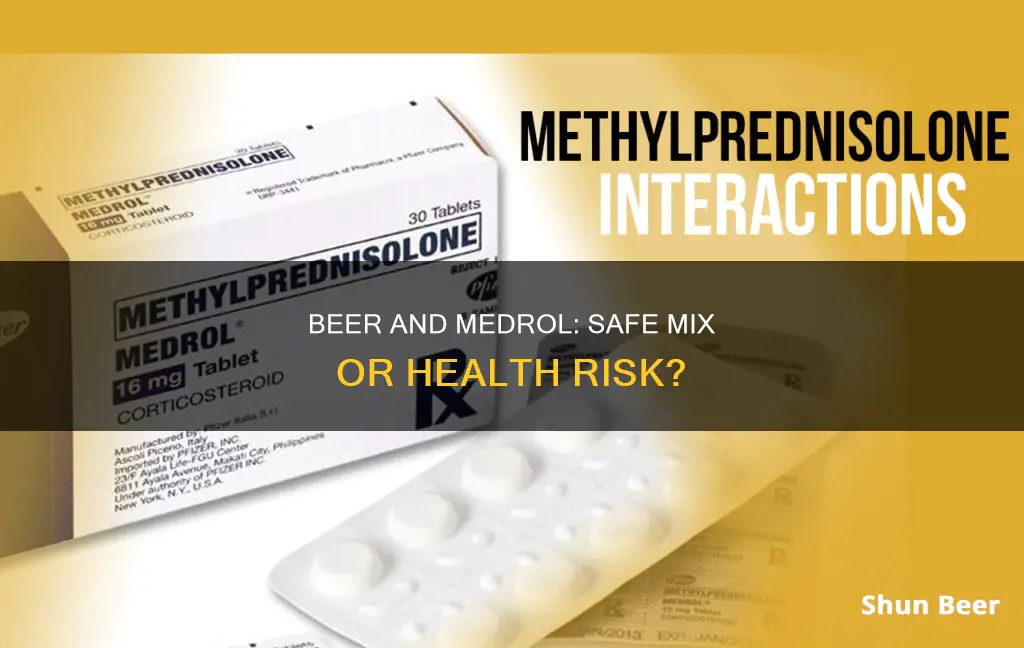
Medrol, or methylprednisolone, is a corticosteroid that is used to treat inflammation and suppress the immune system. It is often used to treat certain forms of arthritis, skin, blood, kidney, eye, thyroid, and intestinal disorders, severe allergies, asthma, and certain types of cancer. While there is no direct drug interaction between Medrol and alcohol, it is not recommended to mix the two. This is because both Medrol and alcohol can irritate the digestive tract and cause peptic ulcers, as well as suppress the immune system, increasing the risk of infection. Additionally, Medrol can affect metabolism, which could influence the effect of alcohol on the body. It is always best to consult with a doctor to determine if it is safe to consume alcohol while taking Medrol, as it may depend on various factors such as dosage, length of treatment, and other medical conditions.
| Characteristics | Values |
|---|---|
| Should I drink beer while taking Medrol? | It is not recommended to drink beer while taking Medrol (methylprednisolone) as it is a corticosteroid that suppresses the immune system. Alcohol also suppresses the immune system, so the combination may be harmful if you develop an infection. Additionally, both alcohol and Medrol can irritate the digestive tract and cause peptic ulcers. |
| Can I drink beer in moderation while taking Medrol? | It may be okay to drink beer in moderation while taking Medrol, especially if your dose is low and you are not taking it for long-term treatment of a chronic condition. However, it is always best to consult with your doctor first as they are most qualified to determine if it is safe for you based on your medical history. |
What You'll Learn

The effects of alcohol and Medrol on the body
Medrol, or methylprednisolone, is a corticosteroid, similar to a natural hormone produced by the adrenal glands. It is often used to treat inflammation and suppress the immune system in certain autoimmune disorders like multiple sclerosis, Crohn's disease, and rheumatoid arthritis.
While there is no direct drug interaction between Medrol and alcohol, it is still not recommended to mix the two. This is because Medrol and alcohol have similar effects on the body, and combining them may increase the risk of certain side effects.
- Immune system suppression: Both Medrol and alcohol suppress the immune system, making it harder for the body to fight off infections. This effect may be especially problematic for people being treated for autoimmune diseases, as they are already at a higher risk of infection.
- Changes in blood sugar levels: Medrol can increase blood sugar levels, and this effect may be enhanced by alcohol consumption. People who are already at risk of developing type 2 diabetes or who have taken Medrol for a long time may be more susceptible to this side effect.
- Damage to the stomach and digestive tract: Both Medrol and alcohol can irritate the digestive tract and cause peptic ulcers. Combining the two may be problematic, especially for people prone to indigestion or stomach upset.
- Osteoporosis: Long-term use of Medrol can lower bone mineral density and increase the risk of osteoporosis and bone fractures. Drinking excessive amounts of alcohol for long periods while taking Medrol may further increase this risk.
- Adrenal gland suppression: Prolonged use of Medrol can suppress the adrenal glands, leading to a decrease in the natural production of corticosteroids.
- Other side effects: Medrol may also cause dehydration with electrolyte imbalances, impaired wound healing, high blood pressure, high cholesterol, and changes in mental health.
It is important to note that the risk of side effects increases with higher doses and longer durations of Medrol treatment. Therefore, it is always best to consult with a doctor before consuming alcohol while taking Medrol, as they can determine whether it is safe based on individual medical history and conditions.
Beer and Claritin: Safe Mix or Health Risk?
You may want to see also

Potential side effects of mixing alcohol and Medrol
Medrol (methylprednisolone) is a corticosteroid, similar to a natural hormone produced by the adrenal glands. It is often used to treat inflammation and suppress the immune system in certain autoimmune disorders. While there is no direct drug interaction between Medrol and alcohol, it is not a good idea to mix them. This is because both substances have similar side effects, and consuming them together can increase the risk of these side effects occurring.
Gastrointestinal Problems
Both Medrol and alcohol can irritate the digestive tract and cause peptic ulcers. Consuming them together may be problematic, especially if you are prone to indigestion or stomach upset. Alcohol can also cause inflammation of the stomach lining, leading to stomach ulcers, heartburn, and malnutrition.
Weakened Immune System
Medrol and alcohol both suppress the immune system, making it harder for your body to fight off infections. This effect is compounded when they are used together, increasing your risk of developing an infection.
Changes in Blood Sugar Levels
Medrol can disrupt blood sugar levels, and alcohol can also increase blood sugar levels. Consuming them together may further increase the risk of developing Type 2 diabetes, especially for those already at risk or who have taken Medrol for a long time.
Osteoporosis
Long-term use of Medrol can weaken bones and contribute to the early onset of osteoporosis. Excessive alcohol consumption over a long period can also increase the risk of osteoporosis. Therefore, mixing Medrol and alcohol may further increase the risk of bone-thinning and fractures.
Dehydration and Electrolyte Imbalances
Alcohol consumption can lead to dehydration, and Medrol can cause electrolyte imbalances. Combining the two may increase the risk of dehydration and electrolyte imbalances, which can have serious health consequences.
In conclusion, while there may be no direct drug interaction between Medrol and alcohol, it is not advisable to consume them together due to the potential side effects. It is always best to consult your doctor to determine if it is safe for you to consume alcohol while taking Medrol, based on your specific medical history and condition.
The Process of Canning Beer: A Step-by-Step Guide
You may want to see also

How Medrol impacts the body
Medrol, or methylprednisolone, is a corticosteroid medication that treats inflammatory conditions such as arthritis, lupus, psoriasis, ulcerative colitis, allergic disorders, endocrine disorders, and conditions affecting the skin, eyes, lungs, stomach, nervous system, or blood cells. It is also used to treat certain cancers.
Medrol works by decreasing inflammation and slowing down an overactive immune system, or by replacing cortisol normally produced by the body. Cortisol is a hormone that plays a crucial role in how the body responds to stress, illness, and injury.
Immune System
Medrol suppresses the immune system, making it useful for treating symptoms of autoimmune disorders like multiple sclerosis, Crohn's disease, and rheumatoid arthritis. However, this also means that taking Medrol may increase your risk of getting an infection or make current infections worse. It is recommended to stay away from anyone with an infection that can easily spread, such as chickenpox, COVID-19, measles, or the flu.
Digestive Tract
Medrol can irritate the digestive tract and cause peptic ulcers. Daily alcohol consumption while using this medication may increase the risk of stomach bleeding. It is advised to limit alcoholic beverages and consult a doctor if you are prone to indigestion or stomach upset.
Blood Sugar
Medrol may cause an increase in blood sugar levels, which can be dangerous for people with diabetes. It is important to monitor blood sugar levels regularly and consult a doctor if you experience symptoms of high blood sugar, such as increased thirst or urination.
Bones
Long-term use of Medrol may contribute to brittle bones (osteoporosis). Lifestyle changes that promote healthy bones, such as weight-bearing exercise, stopping smoking, and adequate calcium and vitamin D intake, are recommended to mitigate this risk.
Mental Health
Medrol may cause mood and behaviour changes, including anxiety, nervousness, confusion, hallucinations, irritability, hostility, and thoughts of suicide or self-harm. It is important to monitor mental health and seek medical help if any of these side effects occur.
Allergic Reactions
While rare, Medrol may cause serious allergic reactions, including skin rash, itching, hives, and swelling of the face, lips, tongue, or throat. Seek immediate medical help if you experience any of these symptoms.
Beer Left Outside: Still Refreshing or a Disaster?
You may want to see also

How alcohol impacts the body
It is not recommended to consume alcohol while taking Medrol (methylprednisolone), especially if you are being treated for an autoimmune disease or are prone to indigestion or stomach upset. Methylprednisolone is a corticosteroid that suppresses the immune system and is used to treat certain autoimmune disorders. Alcohol also suppresses the immune system and can irritate the digestive tract, so combining the two could be harmful.
Short-term effects of alcohol
The effects of alcohol on the body can be felt immediately after consumption and can last for a short while. These effects can include:
- Feelings of relaxation or drowsiness
- A sense of euphoria or giddiness
- Slowed or slurred speech
- Changes in hearing, vision, and perception
- Loss of coordination
- Trouble focusing or making decisions
- Loss of consciousness or gaps in memory (blackouts)
- Dehydration-related effects such as nausea, headache, and dizziness
- Interpersonal conflict
- Altered behaviour, including risky or violent behaviour
Long-term effects of alcohol
Alcohol can also have more lasting effects on the body that may accumulate over time and significantly impact physical and mental health and quality of life. Some of the long-term effects of alcohol include:
- Persistent changes in mood, including anxiety and irritability
- Insomnia and other sleep issues
- Weakened immune system, making it easier to get sick
- Changes in libido and sexual function
- Changes in appetite and weight
- Problems with memory and concentration
- Increased tension and conflict in relationships
- Malnutrition due to damage to the digestive tract
- Ulcers or hemorrhoids
- Cardiomyopathy, stretching and drooping of the heart muscle
- Arrhythmias, irregular heartbeat
- High blood pressure
- Liver disease and chronic liver inflammation
- Pancreatitis, a dangerous inflammation of the pancreas
- Increased risk of several types of cancer, including head and neck, esophageal, breast, and liver cancers
- Bone density loss, leading to an increased risk of fractures
- Muscle weakness, cramping, and atrophy
- Pneumonia or tuberculosis
- Alcohol tolerance and dependence
- Long-term cognitive impairment
Beer Expiration: Safe to Drink After Expiry?
You may want to see also

Precautions and recommendations when taking Medrol
Medrol (methylprednisolone) is a corticosteroid, similar to a natural hormone produced by the adrenal glands. It is often used to treat inflammation and suppress the immune system. While there is no direct drug interaction between Medrol and alcohol, it is not a good idea to mix them. This is because both Medrol and alcohol can irritate the digestive tract and suppress the immune system, among other side effects.
Precautions:
- Alcohol and Medrol can each irritate the digestive tract and cause peptic ulcers.
- Both alcohol and Medrol suppress the immune system, making it harder for your body to fight off infections.
- Alcohol can worsen some of Medrol's side effects, such as changes in blood sugar levels, damage to the stomach and GI tract, dehydration with electrolyte imbalances, and osteoporosis.
- Grapefruit juice may increase the blood levels of Medrol. It is recommended to limit your consumption of grapefruit and grapefruit juice during treatment.
- Medrol may cause hypernatremia, hypokalemia, fluid retention, and elevation in blood pressure, especially with large doses or longer periods of treatment.
- Medrol may elevate serum triglyceride and LDL cholesterol levels if used for longer than brief periods.
Recommendations:
- Consult your doctor before consuming alcohol while taking Medrol, especially if you are being treated for an autoimmune disease or are prone to indigestion or stomach issues.
- Take Medrol with food to prevent stomach upset.
- Eat small meals several times a day to help keep your blood sugar stable.
- Limit your salt intake to prevent water retention.
- Avoid stimulants like caffeine and nicotine, which can worsen insomnia, a common side effect of Medrol.
It is important to discuss any concerns with your doctor and follow their recommendations regarding the use of alcohol while taking Medrol.
How Long Does Beer Last Once Opened?
You may want to see also
Frequently asked questions
It is not recommended to drink beer or any other alcoholic beverage while taking Medrol (methylprednisolone), as alcohol can increase your chances of experiencing side effects and may worsen the condition you are treating. It is best to consult with your doctor before drinking alcohol while taking this medication, as they can advise you based on your specific medical history and conditions.
Medrol is a corticosteroid that can be prescribed for various conditions, including inflammation, autoimmune disorders, and certain types of cancer. Some possible side effects include fluid retention, high blood pressure, high cholesterol, hyperlipidemia, and immune system suppression. It is important to discuss any potential risks and side effects with your doctor before taking this medication.
Grapefruit juice may increase the blood levels of Medrol, so it is recommended to limit your consumption of grapefruit and grapefruit juice during treatment. It is always a good idea to consult with your doctor before making any significant changes to your diet while taking medication.







